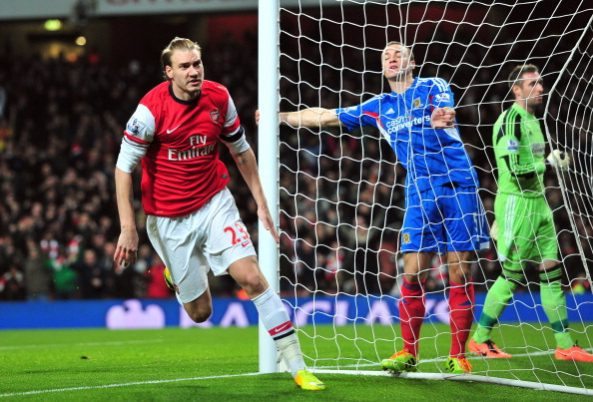Nicklas Bendtner was never a footballer lacking in confidence.

In fact, Bendtner’s levels of self-belief were so high that he measured off the scale when, in 2011, the Dane undertook a confidence test conducted by Arsenal’s sport psychologist Jacques Crevoisier.
“One of the categories is called ‘self-perceived competence,’ i.e. how good the player himself thinks he is,” Crevoisier said. “On a scale up to 9, Bendtner got 10! We have never seen that before.”
As Crevoisier explained, such enormous levels of confidence can be a strength and a weakness. “When Bendtner misses a chance, he is always genuinely convinced that it wasn’t his fault. You might say that’s a problem, and to a certain degree, it can be. But you can also view it as this guy has a remarkable ability to come back after setbacks.”
At the time, the test results made for an amusing anecdote but there were signs then that a promising career was threatening to go unfulfilled. Bendtner had just turned 23 years old and was on loan at Sunderland, then still a Premier League club, having been part of the Arsenal first-team setup for four seasons.
He had reunited at Sunderland with manager Steve Bruce, who five years earlier had taken Bendtner on loan to Birmingham City where the young Arsenal striker excelled, scoring 11 Championship goals and helping the club gain promotion.
A promising career in decline
At the end of that 2006/07 campaign, Bendtner looked to be on the verge of his major breakthrough with the Gunners. Arsene Wenger was an avid supporter and truly believed that the Dane would be Arsenal’s long-term No. 9. However, in the four years between his loan spells under Bruce, Bendtner flattered and frustrated much more than he delivered for the club he joined as a 16-year-old.
Eventually, though, Wenger’s patience ran out and Arsenal’s next great hope saw his career decline to the point where he is currently turning out, at the age of 32, for the ‘Old Boys’ team for the Danish fourth division club Tarnby FF.
Now Bendtner has revealed in his autobiography, Both Sides, the journey of how a young footballer with the world quite literally at his feet threw it all away after being seduced by the wealth, fame, and uncontrollable levels of self-importance attached to life as a Premier League star.
There are many alarming examples in the book of how Bendtner’s career, and indeed his life, went off the rails during what should have been the height of his football career. Perhaps the most shocking was when he went to a London casino and proceeded to lose more than £400,000 on the roulette table.
“I’m way too drunk to sit at a table,” he says. “That much I get. But roulette is a different matter. Red, black, red, black. How hard can it be?” Of course, roulette is specifically designed to give the casino the advantage so even the best roulette strategies are unlikely to ensure long-term wins, but using Bendtner’s drunken logic, it is no surprise that he lost in a big, big way.
Too much talent, not enough humility
For the Danish striker, it was not only the money lost but what it represented: a young man completely devoid of self-discipline who thought he owned an infinite supply of financial resources, and who was convinced – even if only in his drunken state – that eventually the roulette table will turn in his favour for the simple reason of who he is: a famous footballer.
Incidentally, that casino moment took place just a few months after his infamous self-confidence test.
While it may be difficult for some people to have too much sympathy for young men like Bendtner for wasting an opportunity millions of boys and girls can only dream of, his downfall is another sobering reminder of the dangers that are around every corner if a career in the spotlight is not handled with the utmost care.
In the ultra-competitive world of elite sport – particularly football as the world’s most played and beloved game – talent can only take an athlete so far. Hard work, dedication, humility, and a measure of good fortune are all as important in forming a sustainable and successful career.
Blessing in disguise?
Talent was never the issue for Bendtner, at least not during his formative years, but hard work, dedication, and humility were undoubtedly lacking, causing his development as a player to stall while clouding his judgement to appropriately handle off-field distractions.
Whether Bendtner would have indeed fulfilled Wenger’s prophecy – the Frenchman once described the Dane as a “top quality player” – we will never know. However, what his career has shown, and what his autobiography highlights, is how perilous the journey can be to the top of the football pyramid.
A player who once earned the ironic nickname ‘Lord Bendtner’ for his lavish lifestyle and swaggering confidence on the pitch is now just another cautionary tale. As the wealth and fame in professional football only continue to grow to even more obscene levels, the next generation of future stars should learn from Bendtner’s story.
Yet, the person who will ultimately benefit most from his mistakes is Bendtner himself. He has stated his ambitions to step into management, and perhaps there will be no better manager to help keep young players on the straight and narrow than someone who knows all too well how quickly it can all slip away.

